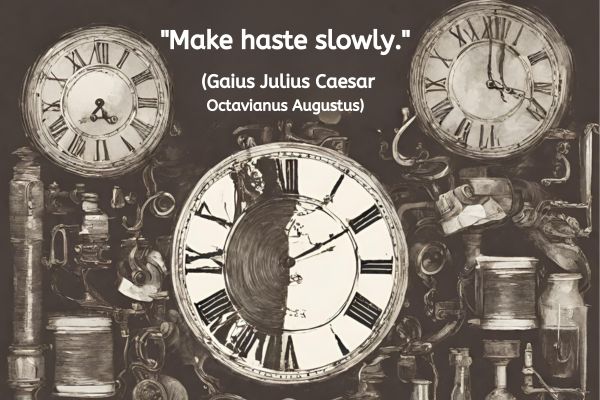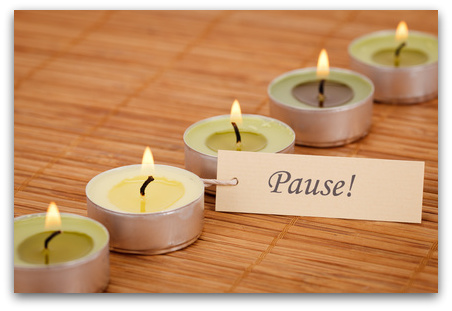“Make Haste Slowly”: A Coach’s Compass for Navigating Life’s Journey

Todays quote prompting some thoughts around and connected to coaching is:
“Make haste slowly.” (Gaius Julius Caesar Octavianus Augustus)
For me, this ancient piece of advice is not a plea to avoid speed altogether, but rather an invitation to take a moment, assess your direction, and acknowledge the progress you’ve made along the way.
In our modern world, where hustle and constant movement are often glorified, the concept of making haste slowly provides a refreshing perspective. It reminds us that adding more and more pressure to our thinking can quickly lead to overwhelm, hindering our ability to operate at our best. It’s no secret that when we find ourselves drowning in stress, our performance tends to suffer.
The beauty of “make haste slowly” lies in its ability to offer a pause—an opportunity to step back and gain a fresh perspective on the situation. It prompts us to ask if our current direction is still aligned with our goals or if it’s time to chart a new course. In the midst of a chaotic journey, a moment of reflection can be the compass that guides us toward clarity and purpose.
As coaches, we understand the importance of pacing ourselves and helping our clients do the same. The quote resonates with the reality that we are often terrible at estimating how long a particular endeavor should take. The pressure to meet unrealistic timelines can lead to frustration and a sense of inadequacy, causing us to lose heart.
“Make haste slowly” becomes a gentle reminder to acknowledge the progress made, even if it feels like we should have reached certain goals sooner. It’s an antidote to the tunnel vision that can occur when we become fixated on the destination, overlooking the valuable lessons and advancements along the way.
The Power of the Pause
In the coaching journey, we often encounter individuals racing towards their goals, fueled by the desire for quick results. This sense of urgency can be motivating, but it can also blind us to the subtle signs and lessons that the journey presents. “Make haste slowly” advocates for the power of the pause—a deliberate moment to breathe, assess, and recalibrate.
Consider a client striving for career success at a breakneck pace. The pressure to climb the corporate ladder quickly may lead to burnout and a loss of sight regarding personal growth and well-being. As coaches, we can introduce the concept of making haste slowly, encouraging our clients to reflect on their journey, appreciate their progress, and ensure their goals align with their values.
Navigating the Unpredictable Terrain
Life, much like a winding path through a dense forest, is unpredictable. We may encounter unexpected twists and turns, obstacles, and detours. “Make haste slowly” becomes our compass, guiding us through the unpredictable terrain with a steady hand. Instead of viewing detours as setbacks, we can approach them as opportunities for growth and learning.
In coaching sessions, we witness clients grappling with unforeseen challenges. The pressure to quickly overcome obstacles often leads to frustration and impulsive decision-making. By introducing the principle of making haste slowly, we guide them to navigate the unpredictable terrain with patience and resilience. It’s a reminder that progress, even in the face of setbacks, is still progress.
Embracing the Journey, One Step at a Time
Our society often celebrates the destination—the achievement of goals, the realization of dreams. However, “make haste slowly” encourages us to shift our focus from the endpoint to the journey itself. The quote invites us to savor each step, embracing the process of growth and self-discovery that occurs along the way.
As coaches, we play a crucial role in helping our clients appreciate the richness of their journey. It’s not just about reaching the summit; it’s about the transformation that happens during the climb. By instilling the wisdom of making haste slowly, we guide our clients to celebrate their progress, no matter how incremental, and to find joy in the unfolding journey.
Conclusion: The Art of Balanced Progress
In conclusion, “Make haste slowly” is not a call to abandon ambition or progress but an invitation to infuse our journey with balance. It encourages us to blend speed with mindfulness, urgency with reflection, and ambition with patience. As coaches, let’s continue to weave this timeless wisdom into our guidance, helping ourselves and our clients navigate the intricate and rewarding path of personal and professional development.
So, fellow coaches, how has this timeless concept influenced your coaching journey? Have you found yourself or your clients benefitting from the practice of making haste slowly? Share your thoughts and experiences below. Let’s continue to learn from each other as we navigate the intricate and rewarding path of coaching.
About Jen Waller

Jen Waller is on a mission to support, nurture and encourage coaching skills and talents from non-coach to coach and beyond.
As an experienced coach and trainer Jen is happy to utilise all skills at her disposal to assist clients from getting out of their own way and making a difference in the world with their coaching. Find out more about the support Jen offers here.

